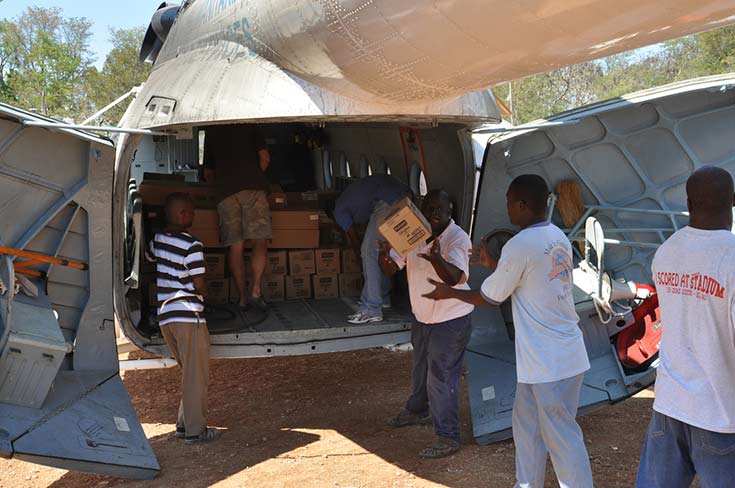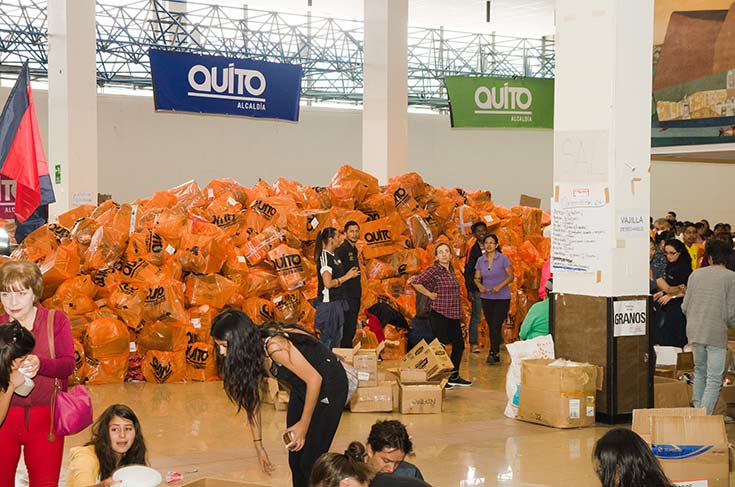What’s on the agenda at AIDF? Why emergency procurement strategies are so important
Ahead of next week’s Global Disaster Relief Summit, Founder and CEO of The Level Market, Stephanie Cox, says the aid industry is ripe for a customised, open ecommerce platform than the aid world.

Haiti Earthquake 2010: A UN Humanitarian Air Services helicopter is used to airlift supplies for the Albert Schweitzer Hospital. Direct Relief collaborated with partners to deliver medical aid to the injured as efficiently as possible. DRI procured medicines specifically requested by its partners on the ground in Haiti. Stephanie Cox says that many NGOs and similar organisations have trouble sourcing and procuring the necessary emergency aid products when they are needed (photo courtesy Direct Relief)
A focus of this year’s Global Disaster Relief Summit (AIDF) is emergency procurement strategies. As a start-up whose mission is to create a global, transparent marketplace for purchasing aid supplies, we will attend with open ears.
Throughout my career, I noticed the proliferation of innovations directed towards victims of natural and manmade crises and those who live in poverty that make up the majority of the world’s population. While applauding the myriad of inventions coming out of humanitarian engineering departments, social enterprises and crowdfunding sites, I was still having trouble finding those products when I needed them in my work in conflict zones and for development programmes. I knew emerging products like cook stoves and solar lights often have higher efficiencies and lower price points and would be valuable additions to our work.
When I attended conferences, I heard the same complaints over and over again about locating, sourcing, and purchasing aid supplies: We can’t find what we want, when we want it, and at the price we can afford. Good quality products are hard to find or distinguish from the rest. We can’t easily purchase supplies, especially the groundbreaking ones. It takes too long to go through competitive bidding processes and there are many compliance factors.
I’m not surprised that ‘emergency procurement strategies’ are on the agenda again, but I am happy to report that there is progress on several fronts. Just as new technologies were applied 10 years ago to humanitarian innovations, today’s tech can streamline emergency procurement and provide aid more efficiently to those that need it most.

April 2016: Volunteers providing disaster relief for earthquake survivors in Quito, Ecuador (Pablo Hidalgo/123rf)
I founded The Level Market (TLM) in 2015 after observing the effects that Amazon, Alibaba and eBay had on both consumer and B2B purchasing. I never saw an industry more ripe for a customised, open ecommerce platform than the aid world. TLM is just that. An online destination that not only has your in-demand goods such as blankets, tarps, and tents; it has innovations including solar chargers, water filters, and birthing kits. Buyers can conduct side-by-side comparisons on specs and certifications, save items for HQ or field staff to review, get competitive quotes with one click, purchase products and manage payments and records on the site.
While I started building the site with aid buyers in mind, it has also become apparent that aid suppliers and inventors were hungry for an aggregated platform on which to list their products. Individual websites, catalogues, and conference attendance, while valuable, are a cumbersome method to find and be found. Our aim is to become the Amazon for Aid – where buying water filters for refugees is as easy as buying books.
AIDF’s Summit will give us an opportunity to make the human connections outside of the platform. We’ll be fed important updates and timely information on efforts to deploy the right products to hot spots around the globe. We’ll be listening and incorporating valuable learning into our platform so that hard-working aid buyers and suppliers can serve those in need effectively.
For more information on the Global Disaster Relief Forum (AIDF) click here
Stephanie Cox is Founder and CEO, The Level Market. She has a 17-year history leading technology and consumer goods companies in conflict zones and emerging markets spanning food security, water and sanitation, clean tech and micro finance sectors. With fieldwork in more than 20 countries and as a survivor of the 2004 Asian tsunami, she’s witnessed the plight of those living in poverty and suffering from disasters.
She started her career as a journalist for a thinktank and from there she lived and worked in Eastern Europe.? In 2000, she joined iDE, a leader in market-based sales in developing countries. During her time at iDE she also lived in Nepal, expanding operations during the civil war. Later, as VP of Africa and Business Development, she helped grow humanitarian programs around the globe. Stephanie joined Nokero International, a solar lighting start-up, as COO in 2014. She was responsible for leading the company’s expansion into the international aid market.
Her extensive time in Asia and Africa has given her a deep understanding of the needs, aspirations, and buying habits of aid organizations as well as consumers at the base of the pyramid. Less than a year ago, she had an epiphany after unsuccessfully searching for a water filtration unit for a project. Just as e-commerce has transformed global markets, the aid world needed to be brought into the 21st century with the power of a new platform. The Level Market was born March 2015 in Golden, CO, USA. It is the first-of-its-kind, B2B e-commerce marketplace connecting buyers and suppliers for the seamless deployment of humanitarian and aid products to those who need them most.
Stephanie Cox, 02/09/2016